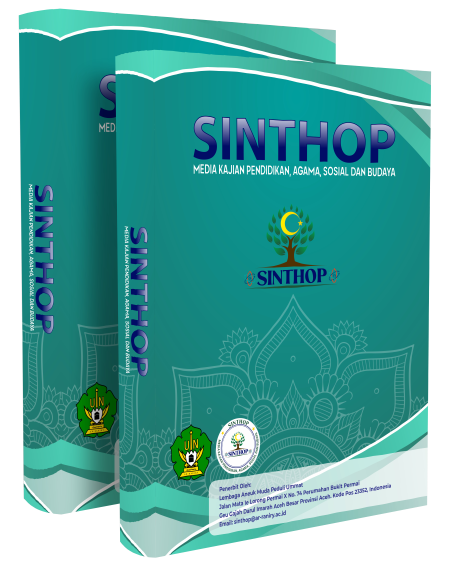The Application of Islamic Business Ethics in the Behavior of Traditional Market Vendors: A Case Study at Lambaro Central Market, Aceh Besar
DOI:
https://doi.org/10.22373/sinthop.v3i2.7637Keywords:
Islamic business ethics, trader behavior, traditional market, Aceh BesarAbstract
This study investigates the application of Islamic business ethics among fruit traders at the Lambaro Central Market in Aceh Besar. Grounded in Islamic moral philosophy, the research employs a qualitative approach to examine how daily trading practices align with five core ethical principles: tauhid (divine unity), equilibrium (justice), free will, responsibility (amanah), and ihsan (benevolence). Data were collected through field observations and in-depth interviews with selected traders and customers. The findings reveal that while the principle of free will is largely upheld—evident in the freedom given to buyers to make informed choices—other principles are inconsistently applied. Notable ethical shortcomings were found in the areas of product disclosure, weighing accuracy, and prioritization of religious obligations. The study concludes that a significant gap exists between normative Islamic business ethics and actual market behavior. It underscores the need for greater ethical awareness and institutional support to promote a morally grounded marketplace in accordance with Islamic teachings.
References
Alimin, M. (2004). Etika & Perlindungan Konsumen Dalam Ekonomi Islam. Yogyakarta: BPFE.
Alma, B. (1994). Ajaran Islam dalam Bisnis. Bandung: Al-Fabeta.
Alma, B. (2015). Pengantar Bisnis. Bandung: Al-Fabeta, 2015
Arifin, J. (2009). Etika Bisnis Islami. Semarang: Walisongo Press.
Arijanto, A. (2011). Etika Bisnis Bagi Pelaku Bisnis. Jakarta: Rajawali Press.
Asnawi, N & Fanani Muhammad Asnan, (2017). Pemasaran Syariah. Depok: PT Rajagrafindo Persada.
Azis, A. (2013). Etika Bisnis Perspektif Islam. Bandung: Alfabeta.
Damayanti, I. (2011). Analisis Faktor-faktor yang Mempengaruhi Tinggi Rendahnya Pendapatan Pedagang Kaki Lima. Surakarta: Universitas Sebelah Maret.
Devos. (1987). Pengantar Etika. Yogyakarta: Tiara Wacana.
Djakfar, M. (2014). Agama, Etika, Dan Ekonomi. UIN-Maliki Press.
Juliyani, E. (2016). Etika Bisnis Dalam Perspektif Islam. Jurnal Ummul Qra, Vol.7, No. 1, 2016, 66.
Kensil, & Christine. (2008). Pokok-pokok Pengetahuan Hukum Dagang Indonesia. Jakarta: Sinar Grafika.
Mufraeni, F. B. (2007). Etika Bisnis dalam Islam. Jakarta: Kencana.
Muhammad. (2004). Etika Bisnis Islam. Yogyakarta: Akademi Manajemen Perusahaan YKPN.
Naqvi, S. N. (2003). Menggagas Ilmu Ekonomi Islam. Yogyakarta: Pustaka Pelajar.
Qardhawi, Y. (1997). Norma dan Etika Ekonomi Islam. Jakarta: Gama Insani Pers.
Rahman. (2002). Penjelasan lengkap Hukum-Hukum Allah (Syariah). Jakarta: Raja GrafindoPersada.
Rivai, V. (2012). Islamic Marketing. Jakarta: PT Gramedia Pustaka Utama.
Subandi, B. (2000). Bisnis Sebagai Strategi Islam. Surabaya: Paramedia.
Sujatmiko, E. (2014). Kamus IPS. Surakarta: Aksara Sinergi Media.
Syarifah Gustiawati, J. A. (2018). Implementasi Etika Bisnis Islam (Studi Kasus Pada Mahasiswa Prodi Ekonomi Syariah Angkatan 2014 Fakultas Agama Islam Universitas Ibn Khaldun Bogor). Jurnal Ekonomi Islam, Volume 9 Nomor 2 Juni 2018, 152.
Taufiq. (2016). Etika Perdagangan dalam Al-Qur'an. Jurnal Hukum Ekonomi Syariah, Vol III, No 01 , 114.
Uchrowi, Z. (2012). Karakter Pancasila Membangun Pribadi dan Bangsa Bermartabat. Jakarta: PT Balai Pustaka (Persero).
Wirawan, Z. d. (2014). Pemahaman Nilai-Nilai Syari'ah Terhadap Perilaku Berdagang (Studi pada Pedagang di Pasar Bambu Kuning Bnadar Lampung). Jurnal Sociologie, Vol. 1, 331.
Zaroni, A. N. (2007). Bisnis Dalam Perspektif Islam (Telaah Aspek Keagamaan Dalam Kehidupan Ekonomi). In Mazahib, Vol. IV No. 2 (p. 181).
Downloads
Published
How to Cite
Issue
Section
License
Copyright (c) 2024 Sibram Malasi

This work is licensed under a Creative Commons Attribution-ShareAlike 4.0 International License.
Authors who publish in SINTHOP: Media Kajian Agama, Sosial dan Budaya agree to the following terms:
- Authors retain copyright and grant the journal right of first publication with the work simultaneously licensed Attribution-ShareAlike 4.0 International (CC BY-SA 4.0) that allows others to share the work with an acknowledgment of the work's authorship and initial publication in this journal.
- Authors are able to enter into separate, additional contractual arrangements for the non-exclusive distribution of the journal's published version of the work (e.g., post it to an institutional repository or publish it in a book), with an acknowledgment of its initial publication in this journal.
- Authors are permitted and encouraged to post their work online (e.g., in institutional repositories or on their website) prior to and during the submission process, as it can lead to productive exchanges, as well as earlier and greater citation of published work. (See The Effect of Open Acces)









.png)

.png)
.png)
.png)


